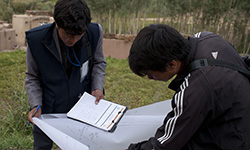The Socio-Demographic & Economic Survey (SDES) in Bamyan Province successfully completed its data collection phase.
Over 500 residents of Bamyan have been employed and trained to become data collectors for what will be a large-scale survey, the first of its kind in Bamyan and the country. The SDES data collectors reached all districts to give the population the chance to be counted.
The surveyors visited every household in the entire province to collect basic demographic data and detailed Socio-Demographic and Economic data from 50 percent of these households in all villages of Bamyan.
The Central Statistics Organisation is mandated to provide the Government of Afghanistan with reliable Socio-Economic data in order to allow for effective and fair governance, planning and resource distribution. With the technical support of UNFPA and the financial support of the Government of Japan, the Socio-Demographic and Economic Survey (SDES) in Bamyan will provide essential data for the provincial government to effectively serve the population.
"Population dynamics - including changing population size, structure and distribution, involving fertility, mortality and migration, among others - influence every aspect of social and economic development. Generating, analyzing and disseminating population data is critical for good governance and helps establish sound and successful development policies and programmes. The United Nations Population Fund is pleased to see this Socio-Demographic & Economic Survey taking place here in Bamyan province and we are proud to see the unique employment opportunities this large scale survey is creating for the people of Bamyan" said Mr. Arie Hoekman, UNFPA Representative.
"Before this project arrived in our district we were all unemployed youth, so this has provided us with a great opportunity to not only earn money but to develop our skills for future work", said a data collector from Yakawlang district.
It is hoped that the Socio-Demographic and Economic Survey will potentially be rolled out in all 34 provinces with the continued support of UNFPA and international donors. This will eventually provide Afghanistan with robust national and sub-national data on size, age structure and gender of its population. Importantly, the SDES will also collect data on migration, as well as educational and professional characteristics of the population, such as school attendance and literacy.
At one of the numerous training events around the province, a young man from Saighan district said, "As young Afghans it is our responsibility to perform the duty of data collection in our communities, for the future development of our district and of our country".
The data collection process successfully ended today. Meanwhile, a data processing centre is being established in the centre of Bamyan province, where the completed questionnaires will be sent for data entry. Data is expected in early 2012.
"We will do all we can to cooperate and to inform all of the villages in our district of this activity, so that we can be successful in this project", said the head of the village shura in Kahmard district.
To monitor the data collection process, a delegation from the Government of Japan lead by Ms. Aoi Yagamishi visited Bamyan.
"We are glad to see that the population of Bamyan province is strongly cooperating with the SDES process as well as are proud that Japan could make a good contribution to this very important project. We are hoping to continue our support for the development of large scale survey in other Afghanistan provinces", said Ms. Aoi Yagamishi of the Embassy of Japan.

